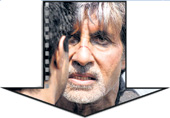 |
 |
| ONCE IS NOT ENOUGH: The Sholay remake and Umrao Jaan (top and bottom) have tanked. |
It was a critical moment. When a devilish Shah Rukh Khan smirked and said “Mujhey jangli billiyan bahut pasand hai (I love wildcats),” he not only provided the twist at the end of Farhan Akhtar’s Don, but he also unexpectedly gave Raj Sippy a signal.
“I may not have thought of doing remakes before but I just loved the last 15 minutes of Don. I loved what Farhan did with his version of the film,” says Sippy, who then decided to remake his Eighties’ chartbuster Satte Pe Satta.
But the question is, are remakes viable? Last week, RGV’s Aag became his aargh. A remake of the legendary Sholay, directed by Ramesh Sippy, had viewers fleeing. Kamal Sadanah’s Victoria No 203, also released on August 31, proved lifeless at the box office, as did J.P. Dutta’s Umrao Jaan last year.
Not that Bollywood remakes have always spelt trouble. New presentations of Devdas (2002), Parineeta (2005) and Don (2006) have been hits. Currently, over a dozen more remakes are being drafted, including another version of Sholay, which Pritish Nandy’s PNC Films bought the rights to last month.
“I think there is a huge market for remakes,” says Supran Sen, secretary, Film Federation of India. “It all depends on how it is done. But one must avoid raising expectations too high.”
 |
| Remakes of Devdas, Parineeta and Don (top to bottom) were hits |
Remakes are not an entirely new phenomenon in Bollywood. The trend took off in the Eighties with a slew of Bollywood versions of hit films from southern India. Sadma was an example of that. Director Priyadarshan continues that trend today with flourishing Hindi remakes of popular Tamil and Telugu films.
The lure of remakes takes on an added nuance in times when the film industry is beginning to see greater corporatisation, with more organised finance and international production tie-ups. “There seems to be a scramble to mine the commercial success of old scripts. Old hits have regenerative value. For the first time there is a serious stake in the ownership of intellectual property rights,” explains Rajesh Jain, consulting company KPMG’s entertainment business head and executive director.
But borrowing freely from the original version is no longer as easy as it used to be, with tussles over copyright issues. Ram Gopal Varma wanted to use Sholay in the title, but lost the legal battle with a third generation Sippy, who eventually struck a $100 million franchisee deal for the rights to the film.
Ownership issues caused Raj Sippy to drop the idea of remaking a film once produced by his father — he did not have the copyright to N.C. Sippy’s blockbuster Chupke Chupke. Budgeted at around Rs 22-27 crore, Sippy is now close to signing on the dotted line with an undisclosed company for his remake Seven. (“It’s not a confirmed name yet, it could be Satte Pe Satta 2 also!”).
Many believe that remakes work best if they follow the original after a long gap, and are charged with star power. “Presentation is crucial,” says Sen. “And who you take to reprise a role. Just as Dilip Kumar can’t do a disco today, Amitabh Bachchan can’t do Gabbar. Gabbar is Gabbar.”
To make a remake viable, cracking the contemporary code remains the top concern of most directors. As his directorial debut, Pradeep Sarkar presented the vintage Parineeta successfully. “There are so many versions of Parineeta but I was very sure I was not making a remake. For me what was universal about the film was the mind of a woman who exchanges a garland with a man and therefore believes she is married to him,” he says.
For a multiplex audience, contemporariness is all about getting moments and moods right. Seven, for instance, will have a mix of brothers and sisters instead of seven male siblings. And there was talk that Deven Khote, head of UTV Post, was thinking of remaking Chaudhvin Ka Chand. “Not true, I am not remaking it,” he says. Khote adds that there are remakes all over the world — from King Kong to Titanic. “It is a question of a good or a bad film, of making it well and getting your audience right,” Khote says.
Meawhile, get ready to see John Abraham reprise the role of Bhootnath in Rituparno Ghosh’s version of Sahib Bibi aur Ghulam at a theatre near you. Or, if you prefer, sit it out. With remakes, you never can tell.











